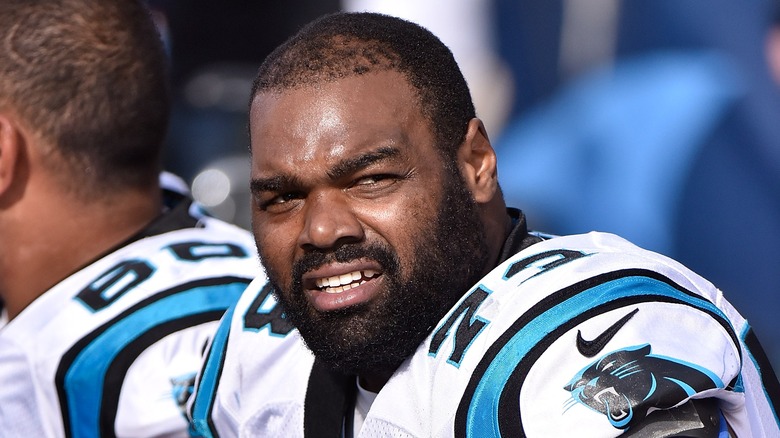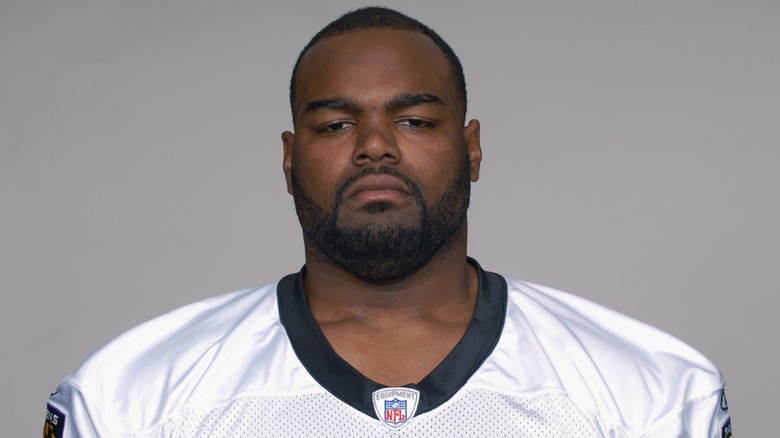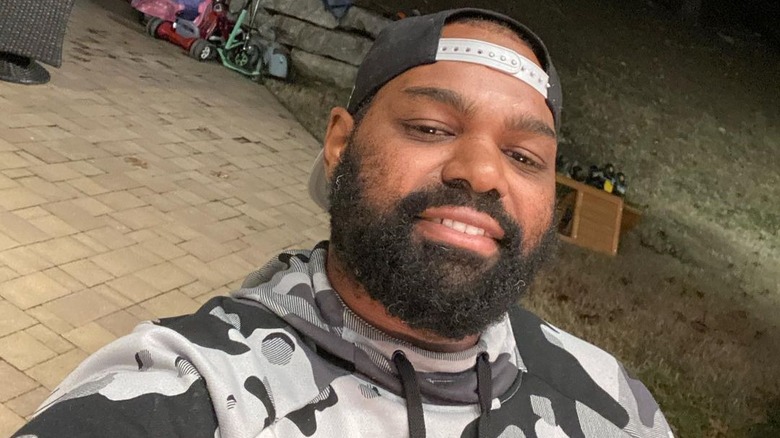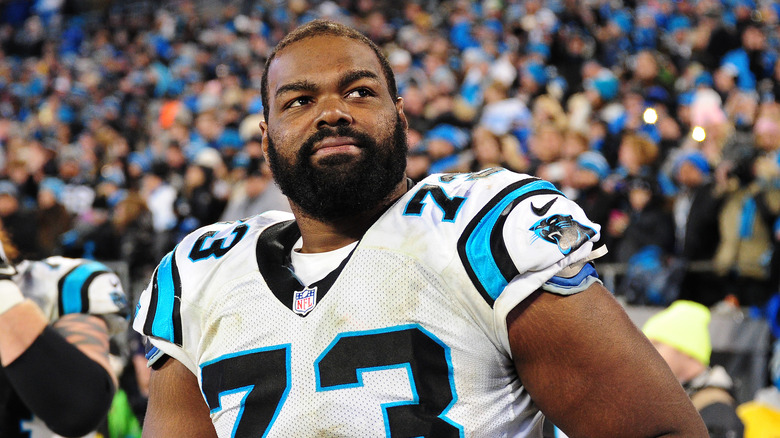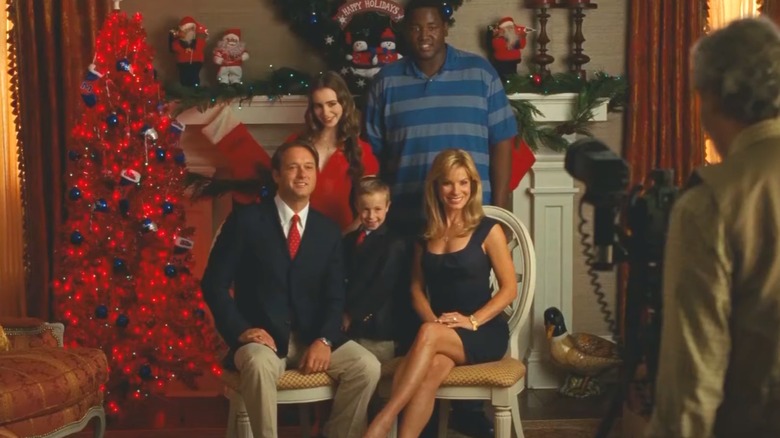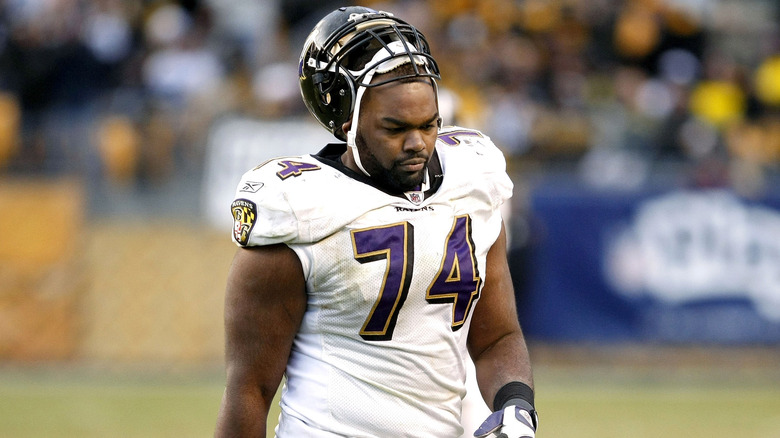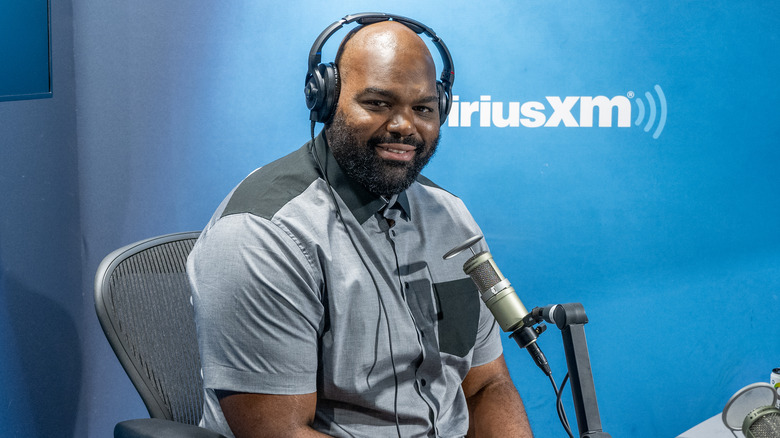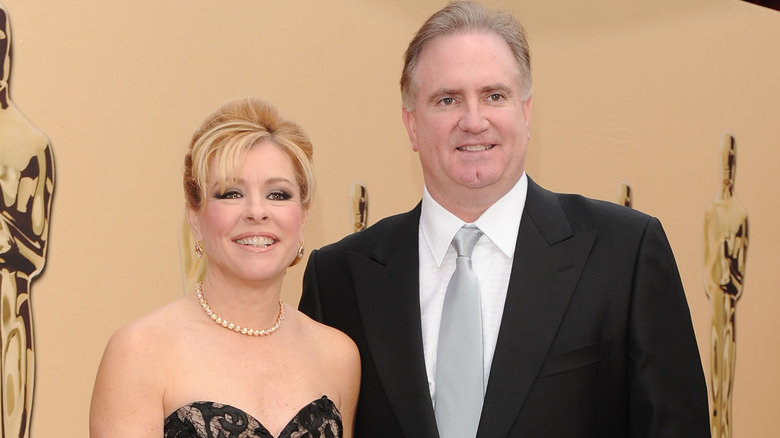Tragic Details About Michael Oher
This article includes references to addiction and mental health.
Some critics of the movie "The Blind Side" probably weren't blindsided by NFL player Michael Oher's allegations that the wealthy couple who once took him in, Leigh Anne Tuohy and Sean Tuohy, didn't always have his best interests at heart. Sandra Bullock's portrayal of Leigh Anne scored her an Academy Award over some fierce competition: Meryl Streep, Helen Mirren, Carey Mulligan, and Gabourey Sidibe. But Oher has always remained detached from Hollywood, despite its fascination with his story. In an August 2023 appearance on the "Unbreakable with Jay Glazer" podcast, he revealed that he hasn't even met Bullock.
It was the Tuohys who first went public with the rags-to-riches story of the impoverished teen who became an exceptional athlete with their guidance and support. The Tennessee couple shared their version of events with author Michael Lewis, whose book "The Blind Side: Evolution of a Game" served as the basis for the movie. "The Blind Side" gives viewers little insight into Oher's feelings and motivations, and it's Leigh Anne who becomes the center of the story. The film has also been derided by many critics for its "white savior" narrative.
But before the Tuohys were seemingly unfairly awarded a considerable amount of credit for Oher's accomplishments — which include being named a first-team SEC offensive lineman, earning a bachelor's degree in criminal justice, and winning a Super Bowl ring — the former NFL star overcame some tremendous obstacles without their aid. The couple Michael Oher once viewed as family has also become part of his tragic past.
Michael Oher experienced homelessness
Michael Oher seized control of his own narrative in 2011 when he published his autobiography "I Beat the Odds: From Homelessness, to The Blind Side, and Beyond." He details what it was like growing up in Hurt Village, a poverty-stricken housing project in Memphis. His mother, Denise Oher, struggled with drug addiction and couldn't provide adequate care for her 12 kids as a single mom. This meant Michael and his siblings had to learn how to survive on their own.
When Denise left for days at a time and locked her children out of wherever the family was staying, the Oher siblings knew she was spending what little money they had on drugs. So, they were forced to rely on the hospitality of friends for shelter and food. "Begging and bumming was just a way of life," Michael writes. It was a regular occurrence for the Ohers to get kicked out of their residences, leaving them homeless. At one point, Michael, his mother, and six of his siblings had to spend an entire month crammed together in a car when they had nowhere else to go, but this wasn't their worst living situation. "We were homeless and living under a bridge for a couple of weeks. That was pretty awful," Michael recalls.
Michael gives his mother credit for providing for the family when she was sober, but writes, "I loved my mother so much that it hurt even more when she would relapse."
Living in foster care was difficult for Michael Oher
Michael Oher came to deeply distrust social workers, fearing they would separate him and his siblings. "We didn't want to lose the one thing we had," he explains in "I Beat the Odds." So, the Oher children came up with a game plan: They fled whenever they saw social workers outside their home. This ploy eventually failed, and Michael Oher felt like he had let his siblings down when they wound up in the foster care system.
In addition to keeping him apart from his siblings, living with foster parents was a painful reminder of something Oher lacked: a parent capable of caring for him. One of his foster parents was a woman who had biological children, which didn't help matters. "The way she looked at them and at us foster kids was tough for me to deal with," he shares.
Oher was allowed occasional visits with his siblings, but this caused him even more anguish. "I would cry myself to sleep, trying to understand why we couldn't just be like that all the time," he recalls. Oher struggled with feeling unloved and even started running away from his foster homes around age eight. When he showed up at his mother's, she sometimes made him leave, but on occasion, she allowed him and his siblings to stay with her. "That was all I wanted — to feel like I belonged, instead of feeling like a burden," he writes.
The NFL alum's father was murdered
Michael Oher's older brother, Marcus Oher, was just 10 years old when he became a fatherly figure for his younger siblings. "He did his best to make sure we all had food, brushed our teeth, showed up at school," Michael writes in "I Beat the Odds." Michael never had a relationship with his biological father, Michael Jerome Williams. Williams was in and out of prison and had very few interactions with his son. One of those rare occasions stands out to Michael, who recalls, "Once he gave me a few dollars when he stopped by to visit my mother, and I thought that was pretty special."
When he was in high school, Michael learned of his father's murder. Per "The Blind Side: Evolution of a Game" author Michael Lewis, Williams' body had been dumped over the side of a bridge. Lewis writes that Leigh Anne Tuohy consoled Michael by telling her young ward that there was an upside to the death: Williams wouldn't be looking to cash in on his familial connection to Michael once he started making money as a professional football player.
Michael suffered another loss in 2007 when his brother, Deljuan Oher, was killed in an automobile accident. As for his mother, Michael revealed that he was estranged from Denise Oher in a 2009 USA Today interview. "For someone to keep doing the same thing, which got all of her kids taken away, it kind of breaks your heart," he said.
Michael Oher hated his portrayal in The Blind Side
"The Blind Side" largely discounting Michael Oher's drive and determination to succeed isn't the only issue with the film in his eyes. In his 2023 book "When Your Back's Against the Wall: Fame, Football, and Lessons Learned through a Lifetime of Adversity," Oher complains that the movie erases a lot of his history, providing viewers with little insight into the hardships he'd already surmounted by the time the Tuohys entered his life. "It made it look like I was sitting there waiting for a handout," he writes.
According to Oher, the Tuohys are given too much credit for helping him in some instances. For example, they didn't teach him how to play a sport he's loved since childhood. "I could not figure out why the director chose to show me as someone who had to be taught the game of football," he writes in "I Beat the Odds." Then there's the matter of his intelligence. "I felt like it portrayed me as dumb instead of as a kid who had never had consistent academic instruction and ended up thriving once he got it," he says.
After he went pro, Oher told ESPN the movie was having a negative effect on his game. It had placed him underneath a microscope, and he was under an enormous amount of pressure to meet everyone's expectations. "People look at me, and they take things away from me because of a movie," he said.
A scary injury ended his football career
"The Blind Side" gave moviegoers a perfect Hollywood ending: real footage of Michael Oher celebrating the beginning of his career with the Baltimore Ravens at the 2009 NFL draft. As a member of the team, the offensive tackle would go on to win a Super Bowl in 2013 — with the Tuohys in attendance. But pro football is no fairytale, and Oher didn't get a happy ending. He suffered a toe injury while playing for the Tennessee Titans, and the team released him after one season in 2015. He then played for the Carolina Panthers from 2015 to 2016, when a concussion cut his NFL career short.
Oher was cut from the team after over nine months in concussion protocol. Before he failed a physical, he had shared a since-deleted Instagram photo of 10 pill bottles in 2017 and captioned it, "All for the brain smh."
While Oher was hopeful that he would be able to return to the field, he told People in 2021, "It took me about two years to get healthy." Out of all the adversity he's faced in his life, he considers his concussion the hardest he's had to grapple with. The NFL alum said he got depressed and gained a lot of weight during his long recovery. "You're thinking about dying. You're just thinking about, 'Is this going to be the night?' every night," he said on the "Unbreakable with Jay Glazer" podcast. But even went he felt hopeless, Oher found the strength to carry on.
His childhood had a long-term effect on his mental health
Michael Oher became a mental health advocate after reaching the realization that his difficult childhood took a major toll on him mentally. "I'm still traumatized and I still deal with things that I dealt with as a kid," he told People in 2021. He revealed that talking about his past in therapy has helped him immensely, and he now knows that the way he was trying to deal with his childhood trauma before isn't healthy. "Sean Tuohy said one time that one of my strongest gifts was the ability to forget," Oher writes in "I Beat the Odds." "He was right. I had needed to forget a lot of stuff in order to not get swallowed up by the hurt and sadness. But I had finally decided that the time was right for me to start remembering."
One reason it was so important to Oher that he address his mental health issues head-on is that he wants to be able to help others struggling with similar trauma from growing up in poverty. His background has given him some valuable insight that few others in his position possess, so he's hoping that he can make a difference by sharing his story. On "Unbreakable with Jay Glazer," he said this is why he decided to write his second book, "When Your Back's Against the Wall." The former NFL star has also founded a charity called The Oher Foundation, which provides scholarships for disadvantaged children.
Michael Oher accused the Tuohys of deceiving him
In August 2023, Michael Oher filed a petition to have a conservatorship dissolved. He alleged that Sean and Leigh Anne Tuohy misled him into believing they were adopting him when he signed the conservatorship, which was put in place before he began playing football at Ole Miss. He's claimed that the couple was then able to broker a deal to get paid for "The Blind Side," while he received no money for his story being spun into what's been deemed as a saccharine cinematic mistruth. "Since at least August of 2004, Conservators have allowed Michael, specifically, and the public, generally, to believe that Conservators adopted Michael and have used that untruth to gain financial advantages for themselves," the petition alleged (via ESPN).
In 2010, Leigh Anne landed a role as a designer on "Extreme Makeover: Home Edition," and she and Sean both appeared on an episode of "Below Deck." So, they've certainly enjoyed some perks in being portrayed as Oher's benevolent benefactors. Speaking to the Daily Memphian (via the Los Angeles Times), however, Sean denied that his family directly profited from the movie and claimed that the conservatorship was to satisfy the NCAA; Sean was an Ole Miss booster, so he had to be Oher's legal guardian for Oher to attend school there. While it seems an adult adoption also would have accomplished this by legally making him a member of the Tuohy family, it's been argued that it wouldn't have given the Tuohys control over Oher's finances.
In addition to feeling hurt and betrayed by the Tuohys' alleged deception, Oher is seeking fair compensation.
If you or anyone you know needs help with addiction or mental health issues, contact the relevant resources below:
-
The Substance Abuse and Mental Health Services Administration website or contact SAMHSA's National Helpline at 1-800-662-HELP (4357).
-
The Crisis Text Line by texting HOME to 741741, call the National Alliance on Mental Illness helpline at 1-800-950-NAMI (6264), or visit the National Institute of Mental Health website.

